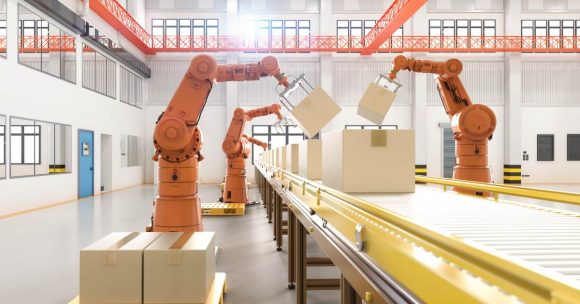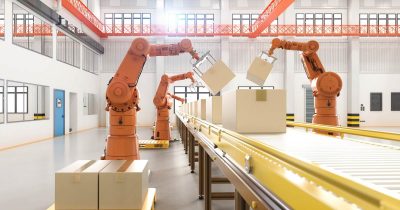Logistics company DB Schenker reports its contract logistics warehouse in the Czech Republic is driving efficiencies. The new site features over 100 autonomous mobile robots (AMR), seven packing lines with 162 stations, a vertical order picker and an automated sorter.
Niklas Wilmking, member of the management board for contract logistics, DB Schenker says, “By deploying automation and robotization, we have been able to optimize processes. This ensures particularly fast and punctual handling and at the same time creates better conditions for employees. After just a few weeks of operation, we were able to achieve a significant throughput for our customer from the electronics sector.”
The autonomous robots are powered by software that records shelf location and location of items. The robots can carry a load of up to 500 kilograms.
Here’s of the autonomous robots are in action:
- The robot picks up the item from the shelf.
- The operator then uses the pick-to-light system to remove items off the shelf.
- Once items are picked, the operator places goods on a conveyor belt.
- Items are then sent to the next department for packaging or consolidation.
GlobeNewswire reports the global warehouse market is estimated to grow at an annual compound rate of 14% in the next six years. This is an impressive growth rate.
Growth in the market is being driven by the demand for storage space and the rising number of merchants in the global market.
Also read: RoboShuttle: Geek+ unveils 40-foot-high warehouse robot
AI in logistics
Artificial intelligence (AI) is changing warehousing operations for the better. We see this in several warehouse operations around the world. Logistics providers are using robots to eliminate repetitive tasks.
In November 2023, Locate2uNews reported on logistics provider UPS opening a large warehouse in Kentucky.
Amazon has introduced a humanoid robot into its warehouse operations. This robot can grasp and lift items.
Logistics firm DB Shenker says in a blog post that AI is transforming almost every industry. “The foundation for AI and AI applications is data. Today, AI has become more popular due to increased data volumes, advancements in algorithms and high computing power combined with storage,” reads the blog.
It adds that AI does not only accelerate a company such as DB Schenker’s digital transformation, but it also ensures a long-term competitive advantage within the logistics industry.
Benefits of warehouse automation
- Safety and reliability: Robotics can handle heavy packaging with ease. Robotics systems can also handle toxic chemicals which allows humans to avoid toxic fumes and exposure to chemicals.
- Inventory management: Automated systems assist companies to prevent backlogs and allows the company to adapt to demand in the market.
- Strong customer satisfaction: Companies can keep customers happy by delivering goods faster.
- Resilient to changes: Automation allows the supply chain to be more agile. This includes times when demand is suddenly high or improves accuracy for prolonged periods.
Now Read: The Importance Of Effective Warehouse Management
About the author
Sharl is a qualified journalist. He has over 10 years’ experience in the media industry, including positions as an editor of a magazine and Business Editor of a daily newspaper. Sharl also has experience in logistics specifically operations, where he worked with global food aid organisations distributing food into Africa. Sharl enjoys writing business stories and human interest pieces.











